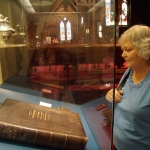This Christmas is the 200 year anniversary of the Gospel being preached in this land! As we survey the last 200 years there is much that is grievous, especially in regards to relationships between those of European descent and those of Māori descent. There is also great hope and joy if we also take the time to remember the impact of the Gospel on these two peoples. It took some time before the Gospel took real traction among the Māori people but when it did it was transformative. God had already given a partial revelation of Himself to the Māori people and had prepared them to receive a fuller revelation through the preaching of the Gospel. Evidence of this transformation is still clear throughout the Māori culture today. For example Wairua Tapu (Holy Spirit) and Ihu Karaiti (Jesus Christ) are regularly honoured in karakia (prayer) because doing so is a Māori practice even in contexts where white New Zealanders usually no longer honour God.
While God was working among Māori people in the 19th century, He was situating people who feared Him in the Colonial Office in Britain. Because of the fear and love of God, these individuals had revolutionary ideas of indigenous people which included a desire for them to be treated with justice as people created in the image of God. These ideas were instrumental in the unique relationship the Crown initially formed with Māori and ultimately in the signing of the Treaty of Waitangi. Missionaries also had a role in the relationship between Māori and non-Māori, in the Treaty and sometimes in pleading with or challenging settlers who failed to honour the Treaty. Unfortunately the transforming power of the Gospel was often not evident in the actions of European settlers toward Māori.
As Christians today, Māori and Pākehā, we still have a ministry of reconciliation (2 Corinthinas 5). I am so fortunate that I know kaumatua (leaders) who have taken this calling seriously. I am noticing that many churches appear to be stirred to embrace this calling at this time. For myself I have seen my own predominantly white church respond to an invitation by these kaumatua to worship God on their marae. Two hundred of us showed up and the name of God and His Word was honoured throughout the Māori tikanga (appropriate behaviour) and powhiri (process of two groups greeting one another and receiving hospitality) as well as through worship in song. I see a new willingness to show deference to one another by honouring each other’s cultural expression of lifestyle and worship (Romans 12:10, some versions saying, “In honour giving preference to one another” while others state “show respect for one another”. I suspect Paul in mind had those who are different from ourselves when he challenged us to show respect.) I cannot help but consider Psalm 133. How good and pleasant it is when brothers dwell together in unity… there God commands a blessing.
Standing on the edge of this anniversary I am convinced this nation will thrive when touched with God’s blessing. I suggest this subject matter would make the focus of some great lesson plans and New Zealand specific extension to the ACE curriculum with your children.
Lesson Plan Ideas
- http://www.bibleandtreaty.co.nz/
- http://www.baptist.org.nz/news/29/22/Gospel-and-Treaty-relationships-at-critical-crossroads-for-church/
- http://www.massey.ac.nz/~plineham/RelhistNZ.htm This is quite an extensive resources which refers directly to several primary sources and is probably only suitable for the oldest students.
- http://www.nzhistory.net.nz/politics/treaty/read-the-treaty/drafting-the-treaty. Viewing a copy of the treaty is possible on this site.
- http://www.baptist.org.nz/uploads/images/TheGathering/The-Gospel-and-the-Treaty-of-Waitangi1.pdf (This link might automatically begin downloading the pdf file) We highly recommend reading this brief resource.
Aim Here are some suggested aims from which you might want to choose.
- To learn about the influence of the Gospel on the Māori culture
- To learn about an aspect of the Māori culture and consider how an early missionary might have used it as a depiction to explain the Gospel (the powhiri might be a fruitful aspect as people move from two separated groups to people in fellowship with one another)
- To appreciate the background leading to the Treaty of Waitangi and why it is important for Christians to know this history
- To consider the role the Church can have in relationships between people groups in New Zealand especially in regards to the tangata whenua/Pakeha relationship considering the heritage of Christian influence in this relationship
Skills used
- Research skills
- Critical engagement with resources
- Analysis of information and application
- Analysis of the implications of worldviews on behaviour (for example the outcomes of a Christian worldview among those in the Colonial Office at the time of the signing of the Treaty compared to the outcomes when the Colonial Office was no longer occupied by these godly men)
- Consideration of personal values
Method of teaching Here is a suggestion of how do develop a lesson plan method.
- You would choose this according to the age of the children and the particular topic you and your children may decide to focus on.
- Once the topic has been decided you would start your children with some questions that they would want to do some research to answer.
- If possible visit Archives New Zealand where you can view: “The nine Treaty sheets displayed in the Constitution Room at Archives New Zealand in Wellington
Evaluation You might have your own evaluation idea, but here are some from us.
- Starting with the aspect you are studying decide if it would be suited to an research essay, a mock newspaper report, a re-enactment of part of the story, a booklet or cartoon strip or maybe a poster as methods of presenting the results of their research and to see how well they have grasped the subject.
Concluding Thoughts

Contemplating New Zealand’s spiritual heritage
As I have engaged with Māori culture and matured in my faith, I have developed greater confidence in God’s ability to guide me in discernment. Over time exposure to the Māori culture has given me a perspective from which to consider the Pakeha culture in which I have been predominantly immersed and enabled me to see ungodly elements, such as consumerism or cultural arrogance, which need the redemptive touch of God. I praise God that in His wisdom He brought these two people groups together who have different strengths and weaknesses and can balance one another. I know under His guidance, and with our cooperation, He can bring healing to broken places in our relationships.



Leave A Comment
You must be logged in to post a comment.